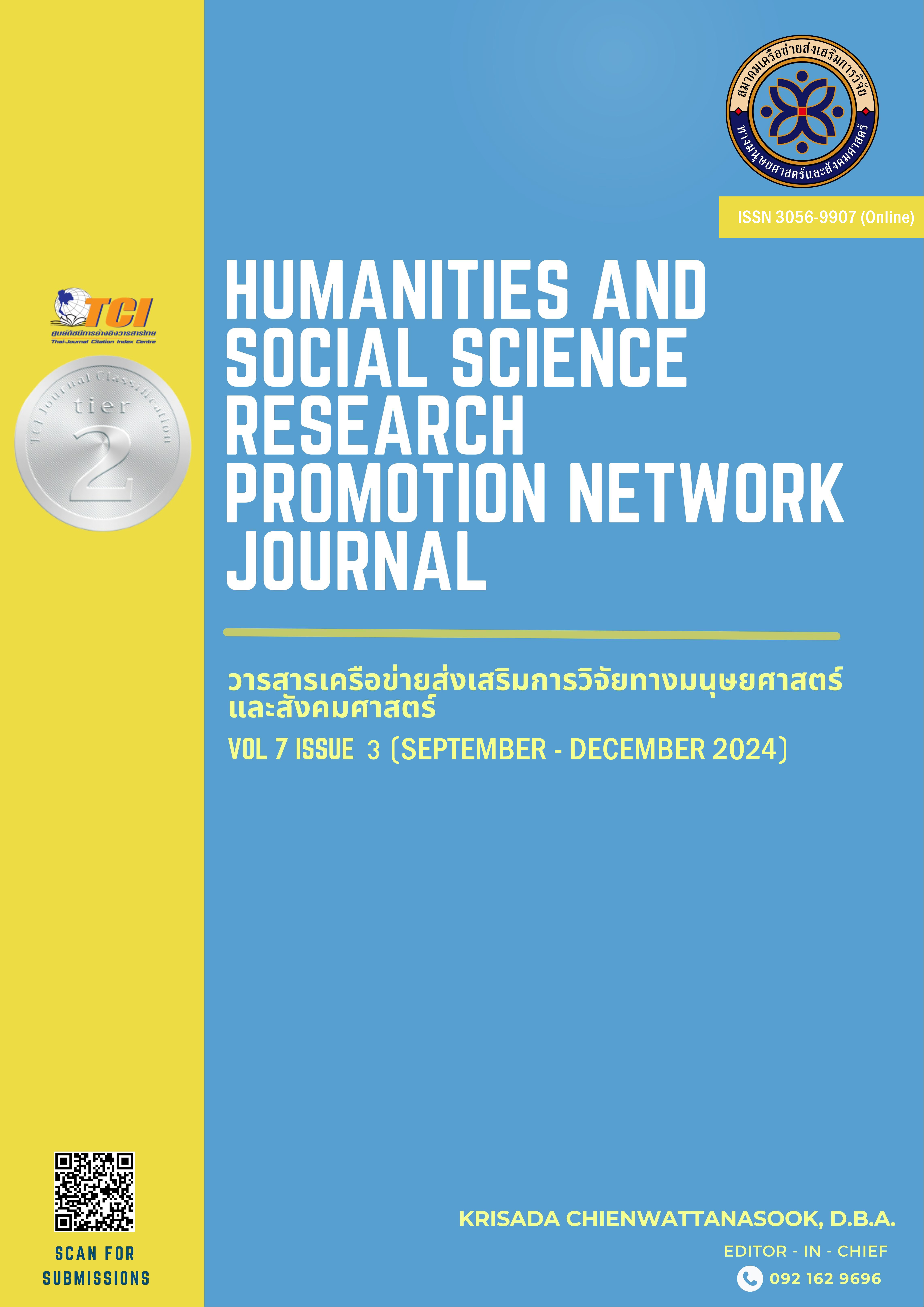พฤติกรรมที่เป็นมิตรต่อสิ่งแวดล้อมที่ส่งผลต่อประสิทธิภาพการทำงานด้านการเปลี่ยนแปลงสภาพภูมิอากาศและสิ่งแวดล้อมของพนักงานในองค์กรภาครัฐแห่งหนึ่ง
คำสำคัญ:
พฤติกรรมที่เป็นมิตรต่อสิ่งแวดล้อม , ประสิทธิภาพการทำงาน , การเปลี่ยนแปลงสภาพภูมิอากาศและสิ่งแวดล้อมบทคัดย่อ
งานวิจัยนี้มีวัตถุประสงค์เพื่อศึกษาปัจจัยการวัดพฤติกรรมที่เป็นมิตรต่อสิ่งแวดล้อมที่ส่งผลต่อประสิทธิภาพการทำงานด้านการเปลี่ยนแปลงสภาพภูมิอากาศและสิ่งแวดล้อมของพนักงานในองค์กรภาครัฐแห่งหนึ่ง ทำการเก็บข้อมูลจากพนักงานกรมการเปลี่ยนแปลงสภาพภูมิอากาศและสิ่งแวดล้อม จำนวน 323 คน เครื่องมือที่ใช้ในการเก็บข้อมูลคือ แบบสอบถาม ทำการวิเคราะห์ข้อมูลด้วยสถิติเชิงพรรณา ได้แก่ ค่าความถี่ ค่าร้อยละ ค่าเฉลี่ย และค่าส่วน เบี่ยงเบนมาตรฐาน และสถิติเชิงอนุมาน ได้แก่ การเปรียบเทียบค่าเฉลี่ยระหว่างกลุ่มตัวอย่างสองกลุ่มที่เป็นอิสระจากกัน การวิเคราะห์ความแปรปรวนทางเดียว และการวิเคราะห์สมการถดถอยพหุคูณ ผลการศึกษาพบว่า ปัจจัยการวัดพฤติกรรมที่เป็นมิตรต่อสิ่งแวดล้อม ได้แก่ พฤติกรรมการรับความคิดริเริ่ม การเปลี่ยนแปลงพฤติกรรม พฤติกรรมความยั่งยืน และ พฤติกรรมการมีอิทธิพลต่อผู้อื่น มีอิทธิพลต่อประสิทธิภาพการทำงานของพนักงานด้านการเปลี่ยนแปลงสภาพภูมิอากาศและสิ่งแวดล้อมอย่างมีนัยสำคัญทางสถิติที่ระดับ .05 นอกจากนี้ ปัจจัยส่วนบุคคลที่ประกอบด้วย อายุ ระดับการศึกษา อัตราเงินเดือน ประเภทตำแหน่ง และระดับตำแหน่ง และระยะเวลาการปฏิบัติงาน ส่งผลต่อพฤติกรรมที่เป็นมิตรต่อสิ่งแวดล้อมและประสิทธิภาพการทำงานด้านการเปลี่ยนแปลงสภาพภูมิอากาศและสิ่งแวดล้อมไม่แตกต่างกัน ในขณะที่ปัจจัยส่วนบุคคลด้านเพศส่งผลต่อประสิทธิภาพการทำงานด้านการเปลี่ยนแปลงสภาพภูมิอากาศและสิ่งแวดล้อมด้านคุณภาพงานแตกต่างกัน แต่ส่งผลต่อพฤติกรรมที่เป็นมิตรต่อสิ่งแวดล้อมแตกต่างกันอย่างมีนัยสำคัญทางสถิติที่ระดับ .05
เอกสารอ้างอิง
กรมการเปลี่ยนแปลงสภาพภูมิอากาศและสิ่งแวดล้อม. (2567). สส. Kick-off NDC ฉบับที่ 2 (NDC 2035) ยกระดับการลดการปล่อยก๊าซเรือนกระจก เปลี่ยนผ่านไปสู่เศรษฐกิจสังคมคาร์บอนต่ำ. https://www.dcce.go.th/news/view_public.aspx?p=18246
กรมส่งเสริมคุณภาพสิ่งแวดล้อม. (2566). ความสำคัญของ COP21 และบทบาทของไทยที่จำเป็นต้องไปเข้าร่วมประชุมและแสดงท่าทีในฐานะประเทศสมาชิก. https://datacenter.dcce.go.th/service-portal/cop23/derivation_cop23/
อัครินทร์ พาฬเสวต. (2551). ปัจจัยที่มีผลต่อประสิทธิภาพการทำงานของพนักงานบริษัทคาโออินดัสเตรียล จำกัด [สารนิพนธ์ปริญญามหาบัณฑิต ไม่ได้ตีพิมพ์]. มหาวิทยาลัยศรีนครินทร์วิโรฒ.
อุทัสน์ วีระศักด์การุณย์. (2556). ปัจจัยที่มีผลกระทบต่อความต้องการในการปฏิบัติงานของข้าราชการตำรวจ กองบังคับการอารักขาและควบคุมฝูงชน [ภาคนิพนธ์ปริญญามหาบัณฑิต ไม่ได้ตีพิมพ์]. มหาวิทยาลัยราชภัฎวไลยอลงกรณ์ ในพระบรมราชูปถัมภ์.
องค์การบริหารจัดการก๊าซเรือนกระจก (องค์การมหาชน). (2567). ข้อมูลปริมาณและมูลค่าการซื้อขายคาร์บอนเครดิตจากโครงการ T-VER. https://www.tgo.or.th/2023/index.php/th/
Alt, E., & Spitzeck, H. (2016). Improving environmental performance through unit-level organizational citizenship behaviors for the environment: A capability perspective. Journal of Environmental Management, 182, 48-58. https://doi.org/10.1016/j.jenvman.2016.07.034
Bashirun, S. N. (2019). Fostering Organizational Citizenship Behavior for the Environment in Promoting Employee Green Behavior at the Workplace. International Journal of Business and Management, 3(1), 18-24.
Boiral, O., & Gendron, Y. (2011). Sustainable development and certification practices: Lessons learned and prospects. Business Strategy and the Environment, 20(5), 331-347. http://dx.doi.org/10.1002/bse.701
Boirel, O., & Paillé, P. (2012). Organizational Citizenship Behaviour for the Environment Measurement and Validation. Journal of Business Ethics, 109(4), 431-445. https://doi.org/10.1007/s10551-011-1138-9
Cantor, J. C., Belloff, D., Monheit, A. C., DeLia, D., & Koller, M. (2012). Expanding Dependent Coverage for Young Adults: Lessons from State Initiatives. Journal of Health Politics, Policy and Law, 37(1), 99–128. https://doi.org/10.1215/03616878-1496056
Demirel, P., & Parris, S. (2015). Access to finance for innovators in the UK’s environmental sector. Technology Analysis & Strategic Management, 27(7), 782–808. https://doi.org/10.1080/09537325.2015.1019849
Dilchert, S. (2018). Multicultural experience: Development and validation of a multidimensional scale. International Journal of Intercultural Relations, 65, 1–16. https://doi.org/10.1016/j.ijintrel.2018.04.004
Elkington, J. (1998). Cannibals with forks: The triple bottom line of 21st century business. New Society.
Etzion, D. (2007). Research on organizations and the natural environment: 1992-present. Journal of Management, 33, 637-664. http://dx.doi.org/10.1177/0149206307302553
E-Vahdati, S., Wan-Hussin, W. N., & Mohd Ariffin, M. S. (2022). Sustainability performance and board compensation in Japan and ASEAN-5 countries. Borsa Istanbul Review, 22(2), S189-S199. https://doi.org/10.1016/j.bir.2022.12.004
Fynes, B. & Voss, C. (2002). The moderating effect of buyer-supplier relationships on quality practices and performance. International Journal of Operations & Production Management, 22(6), 589-613. https://doi.org/10.1108/01443570210427640
Ones, D. S., & Dilchert, S. (2012). Environmental sustainability at work: a call to action. Industrial and Organizational Psychology, 5(2012), 447-469.
Paillé, P., Raineri, N. & Boiral, O. (2019). Environmental behavior on and off the job: a configurational approach. Journal of Business Ethics, 158(1), 253-268. https://doi.org/10.1007/s10551-017-3758-1
Podsakoff, P. M., MacKenzie, S. B., Paine, J. B., & Bachrach, D. G. (2000). Organizational citizenship behaviors: A critical review of the theoretical and empirical literature and suggestions for future research. Journal of management, 26(3), 513-563. https://doi.org/10.1177/0149206300026003
Robertson, J. L., & Barling, J. (2013). Greening organizations through leaders' in Auence on employees' pro-environmental behaviors. Journal of Organizational Behavior, 34, 176-194. https://doi.org/10.1002/job.1820
Robertson, J. L., & Barling, J. (2017). Toward a new measure of organizational environmental citizenship behavior. Journal of Business Research, 75, 57–66. https://doi.org/10.1016/j.jbusres.2017.02.007
Starik, M., & Rands, G. P. (1995). Weaving an integrated web: Multi-level and multi-systems perspectives of Ecologically Sustainable Organizations. Academy of Management Review, 20, 908-935.
Zacher, H., Rudolph, C. W., & Katz, I. M. (2023). Employee Green Behavior as the Core of Environmentally Sustainable Organizations. Annual Review of Organizational Psychology and Organizational Behavior, 10, 465-494. https://doi.org/10.1146/annurev-orgpsych-120920-050421
Zhenjing, G., Chupradit, S., Ku, K. Y., Nassani, A. A., & Haffar, M. (2022). Impact of Employees’ Workplace Environment on Employees’ Performance: A Multi-Mediation Model. Frontiers in Public Health, 10, 890400. https://doi.org/10.3389/fpubh.2022.890400
ดาวน์โหลด
เผยแพร่แล้ว
รูปแบบการอ้างอิง
ฉบับ
ประเภทบทความ
สัญญาอนุญาต
ลิขสิทธิ์ (c) 2024 สุนันทา บุญประคอง, สุรพร อ่อนพุทธา

อนุญาตภายใต้เงื่อนไข Creative Commons Attribution-NonCommercial-NoDerivatives 4.0 International License.
บทความที่ได้รับการตีพิมพ์เป็นลิขสิทธิ์ของ ผู้เขียน
ทัศนะและความคิดเห็นที่ปรากฏในบทความในวารสารเครือข่ายส่งเสริมการวิจัยทางมนุษยศาสตร์และสังคมศาสตร์จะถือเป็นความรับผิดชอบของผู้เขียนบทความนั้น และไม่ถือเป็นทัศนะและความรับผิดชอบของกองบรรณาธิการ








